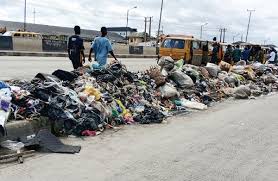
Refuse litters Lagos roads, residents fear disease outbreak
Residents of Lagos have voiced concerns regarding a potential disease outbreak due to the accumulation of refuse that now clutters major thoroughfares in various areas of the state.
From Iyana-Ipaja to Abule Egba, Oshodi, and Iyana-Iba, it has been noted that mounds of waste have become a frequent sight.
A similar scenario was observed along the Isheri-Jakande road, in Agege, and in certain regions of Lagos Island.
This situation has left residents apprehensive about its health consequences.
During separate interviews conducted on Saturday, the residents expressed their frustrations regarding government inaction.
Kunle Ayeni, a resident from the Igando area, remarked that the issue has persisted for over three months without any noticeable intervention from waste management authorities.
He stated that the piles of refuse have not only overtaken sections of the road but have also emerged as a significant source of discomfort for both residents and commuters.
"The odor is unbearable, particularly when it rains. The stench from the refuse permeates the street and infiltrates our homes. At times, we are unable to open our windows. Flies have infested the area. We have reported this to the PSP office nearby, but no action has been taken."
In a similar vein, Deola Davies, a resident along the Isheri-Jakande Road, conveyed her worries about the lack of governmental response to the situation.
She stated, "The problem of refuse cluttering the roads is no longer a new phenomenon for us. It has escalated into a serious concern, and it appears as though we no longer have a functioning government in the state. People are discarding refuse on the median, and the PSP operators neglect to remove it. Consequently, we are left to endure the foul smell. Those areas of the roads now reek."
Another resident, Funmi Adagba, mentioned that the refuse remains on the road for nearly two weeks without being cleared.
She remarked, "The refuse is left on the road for almost two weeks, and at times, it becomes so excessive that it begins to overflow onto the road. We urgently require the government's attention on this matter."
Some residents have also attributed the situation to the purported inefficiency of waste management operators.
In discussions with our correspondents, the residents expressed that despite making regular payments to Private Sector Participants operators, refuse collection has become inconsistent and inadequately supervised.
In Shibiri, located in the Ojo area, a resident named Esther Owobayi reported that the operators now collect refuse only once a month.
She stated, “The refuse collectors typically come on a weekly basis, but that is no longer the case. They now come occasionally, sometimes once a month, or even skip months entirely. However, this does not prevent them from collecting LAWMA fees from us. If you fail to pay, they will seal your house.”
Another resident, Funmilayo Ojo, attributed the deteriorating refuse crisis to weak enforcement and insufficient monitoring.
She remarked, “PSP behaves as if they are beyond reproach. When we voice our complaints, no action is taken despite our regular payments. Perhaps this is due to the lack of proper monitoring and stringent law enforcement. There are times when they do not come for weeks or even months. Our experience with PSP here has been the worst.”
At Oshodi Market, traders are now selling next to piles of refuse, enduring unpleasant odours as they conduct their daily business.
“We tolerate the smell because there is no alternative space to sell. Oshodi market is large, but the waste trucks are insufficient to manage the daily refuse,” stated a trader, Kudirat Bose.
Another trader, Chioma Nwachukwu, suggested that the government should supply more mini-trucks for waste collection.
“We cannot hold people accountable for dumping waste on the road. We pay various levies and waste bills, yet the trucks are unable to cope with the volume,” she commented.
In the adjacent Ajao Estate area of the state, our correspondent noted piles of refuse on the streets and at the corners of houses. A resident, Lawal Ishola, expressed his frustration that the refuse in front of his house had not been collected for over three weeks.
He stated, "The PSP operators in our area seem to be on vacation as they have not come to collect the refuse from the corners of the houses, despite our payment of monthly fees. This is quite disheartening."
During a visit to Iyana-Ipaja, piles of rotting refuse were already overflowing onto the roadway.
At Ekoro Road in Abule Egba, a mound of waste consisting of plastic bottles, vegetable scraps, and nylon debris was swarming with flies.
However, traders reported that the piles of refuse reappear within a few days after being cleared.
"They cleared it last week, but before you know it, the dirt returns. It’s as if no one cares," disclosed a roadside trader, Shade Opeyemi.
Another resident, Tosin Akintunde, attributed the indiscriminate dumping to high waste collection fees.
"Even though the PSP operators come to collect refuse, their charges are steep. That’s why many individuals dispose of their waste on the streets," she remarked.
On Friday, a significant pile of refuse was observed marring the well-known roundabout that leads directly to Tafawa Balewa Square on Lagos Island.
When our correspondent returned to the area approximately five hours later, the waste had spread further onto a portion of the road.
Nearby, street vendors, including those selling food items, continued their trade beside the expanding dump, as noted during the visit.
The Lagos State Ministry of Environment and Water Resources, however, attributed the ongoing dumping of refuse on road medians and public areas throughout the state to residents’ reluctance to pay for waste disposal services.
The ministry’s spokesperson, Kunle Adeshina, during a phone interview on Sunday, stated that the state possesses no fewer than 100 waste collection trucks but continues to encounter difficulties due to widespread non-payment.
He stated, "The primary issue is that certain residents of Lagos are unwilling to pay for the waste they produce. The Private Sector Participants (PSP) operators are entrepreneurs. They have invested in their trucks and employ staff who need to be compensated. If they collect your waste and you fail to pay, the debt continues to grow."
Adeshina elaborated that the PSP operators have been facing challenges related to non-payment for an extended period, while the state government has shown restraint in enforcing penalties.
He remarked, "The PSP operators have been dealing with this issue for quite some time. The state government is making efforts to avoid a heavy-handed approach. Essentially, the issue is that individuals are reluctant to pay."
He further noted that numerous residents intentionally dispose of waste during unconventional hours, depending on the Lagos Waste Management Authority (LAWMA) to remove it.
"Individuals leave their homes very early in the morning to discard refuse on the median, knowing that LAWMA will collect it. If LAWMA clears an area by 4 a.m., by 6 a.m. it is already filled again," Adeshina expressed, adding that the government is contemplating alternative strategies to address this behavior.
He also revealed that many households owe PSP operators as much as six months in unpaid bills, complicating their ability to maintain operations.
"People are in debt for five to six months. How do they expect the PSP operators to pay their employees or keep their trucks in good condition?" he questioned.
In an attempt to tackle the increasing issue of roadside dumping, Adeshina mentioned that the ministry has stepped up enforcement through its community waste policing initiative.
"We have implemented a community waste policing system, which is why several offenders have been apprehended. Unfortunately, this has not deterred many. However, we will persist. If we discover a pile of refuse in front of a shop or building, the owner will be held responsible," he cautioned.
Environmental health specialists have warned that the buildup of waste could put residents at risk of disease outbreaks such as cholera and dysentery if immediate action is not taken.





